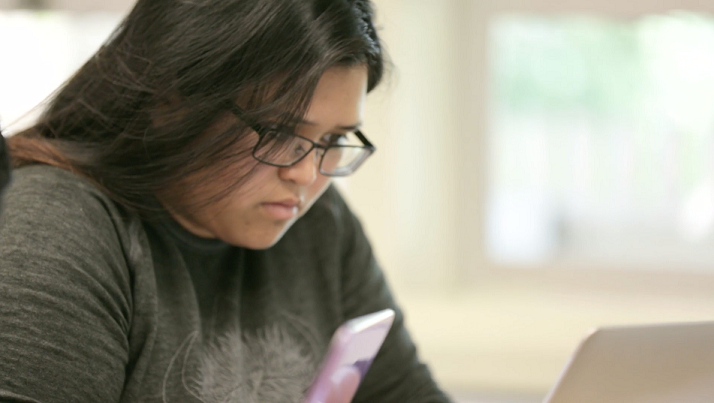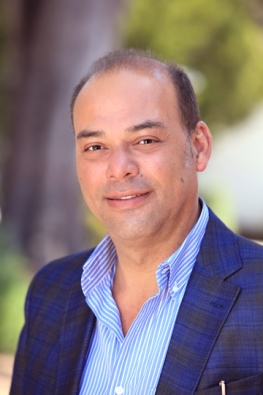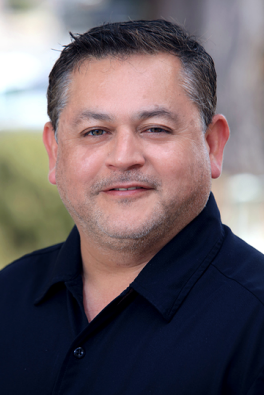Browse course samples and faculty profiles for Spanish Studies.
Building Relationships Through Language
I am hopefully leaving for the Peace Corps next year. And, you know, with that type of experience you need to have a language. I am part of Tandem. It’s a project where students who are learning Spanish go to Soledad, California and visit an organization called Mujeres En Accion, an organization for women in Soledad who wants to learn English but also gain valuable skills for employment.
Yes, we were there to practice our language, but inadvertently I was able to create a relationship with these women, and knowing more about their cultures, and where they’re from, and their life style. I haven’t taken a Spanish course since high school. It was intimidating at first, but I was able to catch up.
Remember what I needed, you know, just like conversational phrases, and eased right back into it. We’re learning the language not just to learn the language but how to use it in conversations of what we would use in our professional careers. If we were talking about politics or the environment or any other aspect of social issues.
There’s just so many benefits and advantages with having a second language, especially in this globalized world where you’re gonna cross paths with people of different cultures and different backgrounds. And Spanish becoming more and more the second most used language across the United States, I think it’s gonna be very helpful to have that.
I’ve learned so much about how to go into the field of development. Things are changing, the world is changing. So the Middlebury Institute is taking us onto new approaches and to new methodologies and tools that we can use.
Sample Courses in Spanish Studies
Spanish in the Community
Allows students to collaborate with ESL learners in Salinas, developing language skills, target-language confidence, community awareness, intercultural competence, and learning autonomy. Initially supported by the Fund for Innovation.
Spanish Social Entrepreneurship
Explores social innovation theory and cases in Latin America and Spain and provides a space for developing language skills through discussions, design-thinking exercises, elevator pitches, and a final project related to a social need in the student’s area of interest.
Human Rights, Identity, and Policy in Latin America
Investigates the relationship between human rights and different issues of identity, gender, and inclusion. The course also attempts to analyze this relationship through public policies and different agents of change.
Advanced Conversations/Politics
This is a content-based and learner-centered class designed to provide students with opportunities to develop and practice language skills in high intermediate/advanced levels. This course focuses on communication in meaningful contexts related to the different challenges in the social, political, and economic life in Latin America
Professional Public Speaking in Spanish
Develops key linguistic and oratory skills in Spanish to deliver informative, persuasive, and commemorative speeches on topics of professional or personal interest while applying the foundations of classical rhetoric. Participants build specific verbal and nonverbal skills through personalized and peer coaching at the cognitive and performative levels. Phonetic, syntactical, and lexical aspects are addressed and adapted to various public speaking genres through a series of awareness-raising activities.
Comparative and International Education in Latin America
Introduces the analysis of the status of education systems and structures in Latin America from a comparative and international perspective. The course addresses the impact of globalization on education systems, and the role that international organizations, NGOs, and the private sector play in providing and financing alternative educational programs at various levels of instruction. Particular importance is placed on the relationship between the evolving democratic systems, equity, and social justice.
Climate Change: Security, Ethics, and Justice Solutions
Addresses three broad topics: climate change and local/national/global security; climate change ethics and justice; and adaptation, mitigations, and solutions for climate change. During plenary sessions, groups of students present and discuss the issues they’ve been researching in their language of study (English, French, or Spanish). Students from the translation and interpretation programs provide simultaneous interpretation, facilitating conversation across languages.
The Environment and Sustainable Development in the Spanish Speaking World
This course has two distinct goals: to expand the vocabulary related to environmental issues and to present an overview of environmental issues and questions in the Hispanic countries today. Students engage in vocabulary-expanding exercises, the review of advanced grammar rules as needed, individual and group presentations, and writing and speaking assignments related to the most current environmental issues today. Class discussions and activities emphasize active use of language in different contexts, including professional discussions, interviews, cultural exchanges, and debates on current topics.
Resources
You may find these resources helpful before you start your Spanish courses.
Faculty
Gabriel Guillén
Associate Professor
- Email:
- gabi@middlebury.edu
- Tel:
- (831) 647-3085
- Office:
- 400 Pacific Street D207
Sabino Morera
Associate Professor; Program Head, Spanish Studies
- Email:
- smorera@middlebury.edu
- Tel:
- (831) 647-6662
- Office:
- McGowan Building MG200B
Pablo Oliva
Associate Professor; Program Chair, Language Studies
- Email:
- poliva@middlebury.edu
- Tel:
- (831) 647-4173
- Office:
- McCone Building M111



